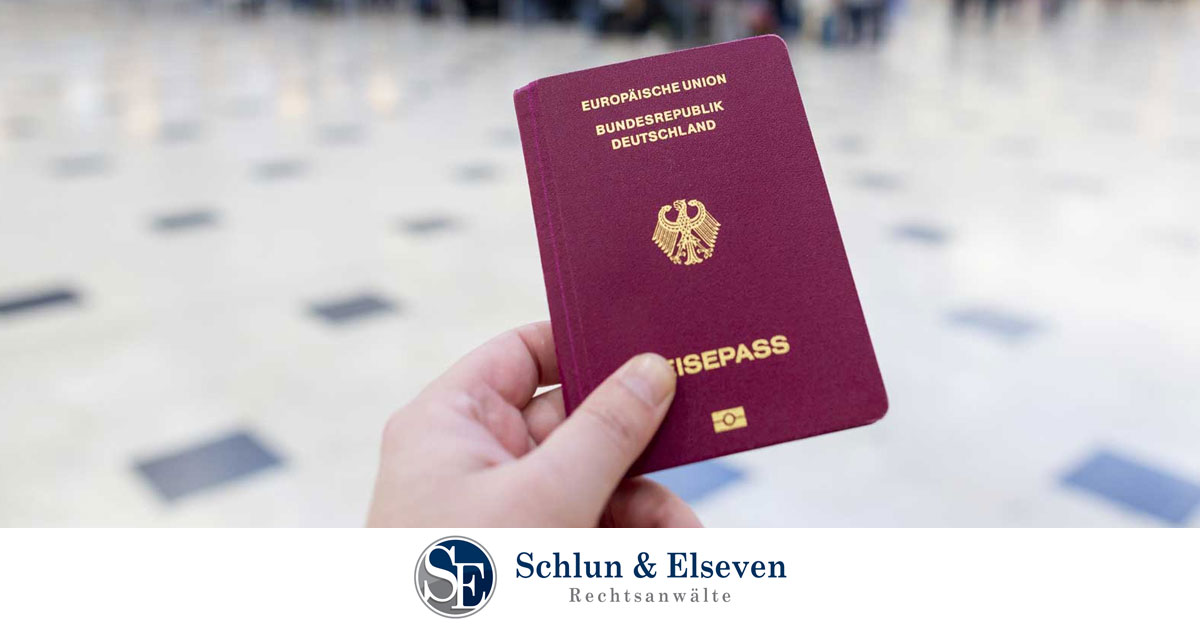§ 116 (2) German Constitution provides for former German nationals who were deprived of their citizenship for political, racial or religious reasons between 30 January 1933 and 8 May 1945, as well as for their descendants, to be entitled to re-naturalisation (so-called “Wiedergutmachungseinbürgerung”). Other types of naturalisation sometimes require a certain knowledge of German or proof of a close relationship to Germany. However, these requirements do not have to be met for successful re-naturalisation. Furthermore, the German legislator does not make naturalisation dependent on the renunciation of a respective existing foreign nationality, even as an exception. The German Constitution deliberately accepts dual citizenship for the rehabilitation of Nazi victims.
At Schlun & Elseven Rechtsanwälte, we are a full-service law firm based in Germany. Our dedicated team of German citizenship lawyers are available to support you with your German citizenship application. Contact us now by phone, by email or by using the contact form below to benefit from our expert assistance.

If you have a particular issue or legal question concerning German Immigration Law, you can contact our law office anytime. Our lawyers for German Immigration Law can be reached by phone, email and also provide video conferencing options. For more legal information, please visit our Immigration Information Germany Center.
New Provisions: German Citizenship for Ancestors of Victims
On 24 June 2021, the German Bundestag approved a far-reaching amendment to the citizenship law, thus laying the foundation for some facilitations in naturalisation. As the law has not yet been signed by the Federal President and published in the Federal Law Gazette, it has not yet entered into force. However, it is expected that these changes will take place in the near future. We will inform you about corresponding changes on our website.
In particular, there will be the following important changes in the law:
Entitlement to Naturalisation without Expatriation under the Nazi regime.
There is an entitlement to naturalisation for persons who were affected by National Socialist persecution measures but who are not entitled to re-acquire German citizenship under the reparation provision of § 116 (2) German Constitution because they were not formally denaturalised. This means that there is no official and individual expatriation certificate for the ancestor. Or that the persecuted ancestor did not live abroad before 1941.
Voluntary Renunciation of German citizenship before 1955
Similarly, there is an entitlement for those persons who, in connection with the persecution measures for the reasons listed in § 116 (2) German Constitution, voluntarily gave up or lost their German citizenship in the period from 30 January 1933 to 8 May 1945 or were unable to acquire it.
This is usually the case in the event of:
- emigration from Germany to a foreign country and the acquisition of a foreign nationality through an application for naturalisation to escape persecution, as well as
- in the case of women who automatically lost their German citizenship by marrying a foreigner to protect themselves from persecution by the Nazi regime.
The renunciation or loss of German citizenship does not have to have occurred between 30 January 1933 and 8 May 1945, but only in connection with Nazi persecution measures before 26 February 1955.
German Language Skills No Longer Required
One of the biggest stumbling blocks for those looking for German citizenship based on descent or ancestry was the necessity to display German language skills to a B1 level. However, one major proposed change is that this need to show German language skills will no longer be required.
Naturalisation Available for Descendants of Ancestors
The right to naturalisation also applies to all descendants in the direct family line. This means children and all descendants in the descending line (grandchildren, great-grandchildren, etc.). In addition, adopted children adopted before 1 January 1977 are also included. Although they could not acquire German citizenship through adoption, they were affected by the after-effects of the fate of persecution in the same way as natural children. Therefore, they are also included under reparation aspects.
No Time Limit
Naturalisation on account of persecution under National Socialism is not subject to a time limit and is therefore possible at any time. This is unlike other forms of citizenship by descent.
Successful Application due to Nazi Persecution of Ancestors
At Schlun & Elseven, our lawyers will be happy to accompany you through the entire naturalisation process, especially in communicating with the relevant German authorities. We have many years of experience in the field as German citizenship lawyers. In the context of restitution naturalisations, it is important to prove the relationship to the persecuted family members through appropriate documents. In addition, documents are required to prove that the ancestors were persecuted in Germany during National Socialism or at least belonged to a group of people who were directly threatened with persecution. This may be the case for Jewish ancestors, among others. Obtaining all the necessary documents can be a time-consuming process, and advice from experts is strongly recommended.
Our team of lawyers in migration law will be happy to assist you with naturalisation. At Schlun & Elseven Rechtsanwälte, we are a full-service law firm with offices in Cologne, Aachen and Düsseldorf and have further facilities in Munich, Berlin, Frankfurt, Stuttgart and Hamburg. We advise clients worldwide on German immigration law. Our team of lawyers in migration law will be happy to assist you with the naturalisation process. Contact us today to start working with our experts.


